Will Sir Philip Green be humbled by MPs?
- Published
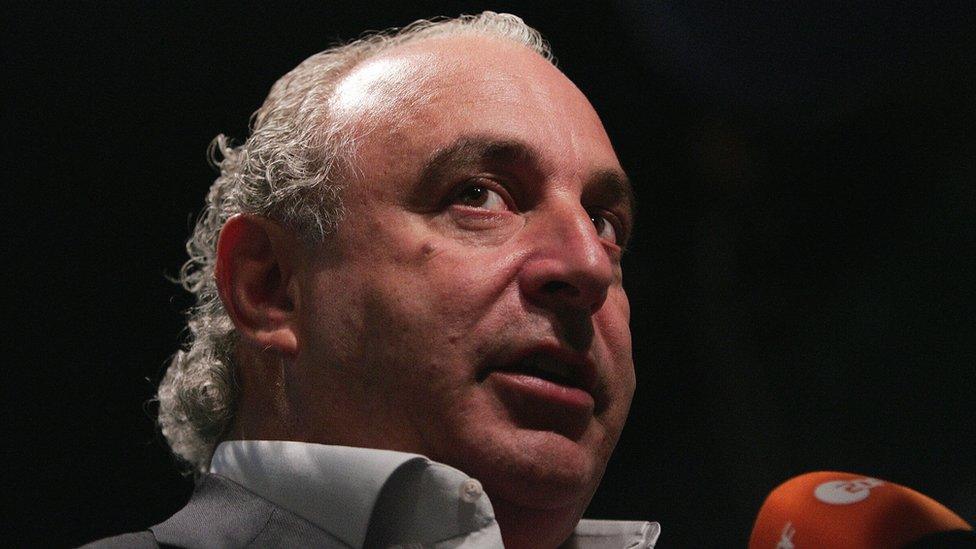
Interesting times for Sir Philip Green
It's fair to say that Sir Philip Green reacts "robustly" when anyone suggests he is in the wrong.
Which makes the prospect of his having to answer questions from members of Parliament over his running of the BHS department store interesting, to say the least.
To give you a taster of what is to come: Sir Philip has already called on Labour MP Frank Field to resign as chair of one of the two committees due to question him.
Mr Field refused and told the Financial Times that if Sir Philip offers to help out BHS pensioners with anything less than £600m, MPs will simply "laugh at him".
Shadow chancellor John McDonnell has said Sir Philip should be stripped of his knighthood if he doesn't turn up.
Sir Philip has said he will attend "to tell my side of the very sad BHS story and I will do my best to answer all the questions put to me in an honest and open way."
All of which suggests the encounter could be lively.
But let us step back for a moment and look at why Sir Philip is to appear in the Wilson Room of the House of Commons on Wednesday morning.
The BHS sale
A year ago, he sold the 88-year-old BHS chain to Retail Acquisitions for £1.
Last month, BHS went into administration with a £571m black hole in its pension fund. No buyer for the company has been found and it is to be wound down.
All this might just be another cautionary tale of the High Street: an old established name, unable to move with the times, folds under the twin pressures of ruthless competition and a moribund economic recovery. After all, clothes retailer Austin Reed met a similar fate in the same month.
But BHS is different. As is Sir Philip Green.
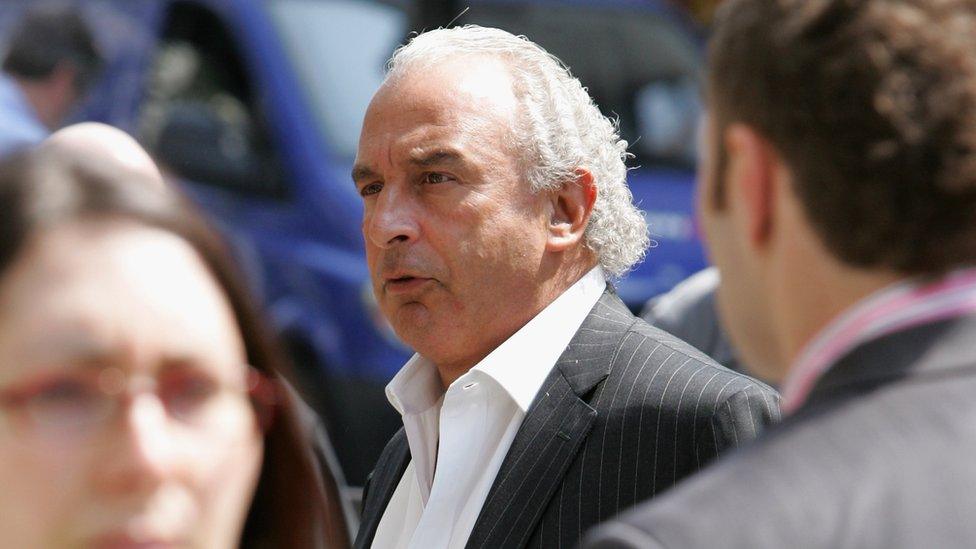
Sir Philip Green: one-time King of the High Street
In recent weeks, details of Sir Philip's treatment of BHS and his relationship with Retail Acquisitions have come to light and it is these that MPs will want explained on Wednesday.
To start with, there is the money that Sir Philip took out of BHS during 15 years of ownership, thought to be about £600m, in dividends, rental payments and interest on loans to other parts of the Arcadia Group, owned by his wife Tina.
There is also the question of how he allowed such a large pension deficit to arise without taking some sort of corrective action. One attempt to restructure the scheme had been unexpectedly halted in 2014.
And most obviously, why did Sir Philip sell BHS to Retail Acquisitions, owned by Dominic Chappell, a former bankrupt and racing driver with no retail experience?
Former City minister Lord Myners described the deal as "like giving the keys of your car to a five-year-old".
Duped?
The relationship with Mr Chappell is particularly intriguing. Some Green-watchers have suggested Sir Philip was duped by him.
Others beg to differ. Sir Philip may be a difficult man, they say, but not one who is easily duped.
Despite being born into a well-to-do family in south London, he prides himself on having worked his way to the top, where he became known as the "King of the High Street," controlling Arcadia, which includes Top Shop, Wallis, Evans and Burton.
He started very much at the bottom. At 15, he began working on the forecourt of the petrol station that his mother managed.
He went on to learn business basics as an apprentice in a shoe warehouse, and at 23, he set up his own business importing and selling jeans.
Stuart Lansley, the author of an unauthorised biography of Sir Philip, described those early days for Radio 4's Profile programme.
"He had a very mixed track record of starting up companies, and closing them down, working with other people, falling out with people.
"He travelled a lot, learning a lot about the supply chain, who the cheaper suppliers were and so on - but he certainly wasn't a household name."
Lavish lifestyle
These days, he is a man who enjoys the trappings of his success. The suspicion that he prospered to the detriment of BHS's long-term health will fire much of Wednesday's interrogation.
Sir Philip's personal fortune is estimated at somewhere between £3bn and £4bn.
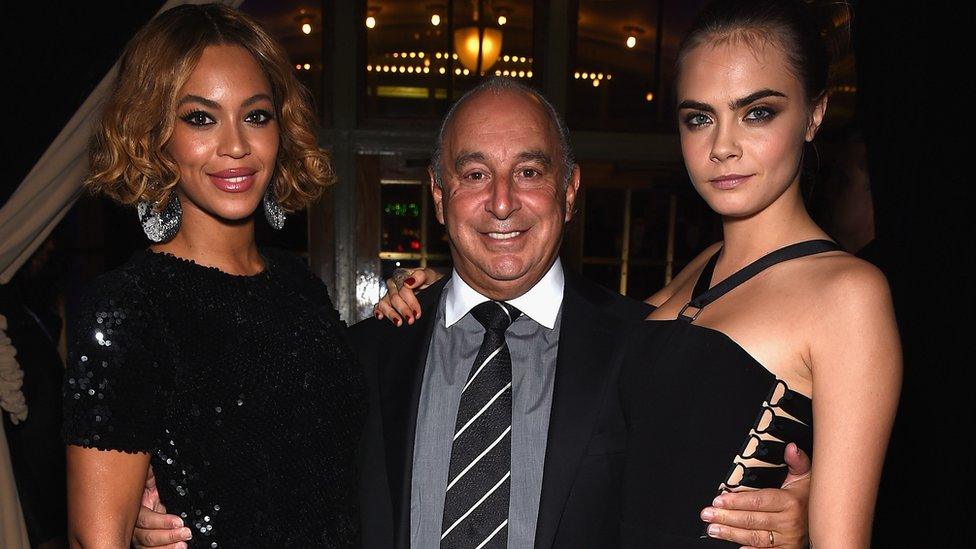
The high life: Sir Philip Green with Beyoncé (L) and model, Cara Delevingne
He commutes into London from Monaco in a private jet, has a super-yacht called Lionheart under construction, and is famous for throwing extravagant parties for friends and family in exotic places, with entertainment from the likes of Beyonce, Jennifer Lopez and George Michael.
He has also forged a business partnership with supermodel Kate Moss, whose line of clothes helped raise Topshop's profile in the world of high fashion.
But a long time before the BHS debacle, Sir Philip was attracting criticism for his tax affairs.
In 2005, Arcadia paid a £1.2bn dividend to its owner - Sir Philip's wife, Tina. Since she is a resident of Monaco, she paid no tax in the UK.
In 2010, activists demonstrated outside the flagship Topshop and BHS stores in central London after Sir Philip was chosen by Prime Minister David Cameron to conduct a government efficiency review.
They thought his tax arrangements made him the wrong choice. Despite their anger, however, Arcadia has still paid significant sums in corporation tax.
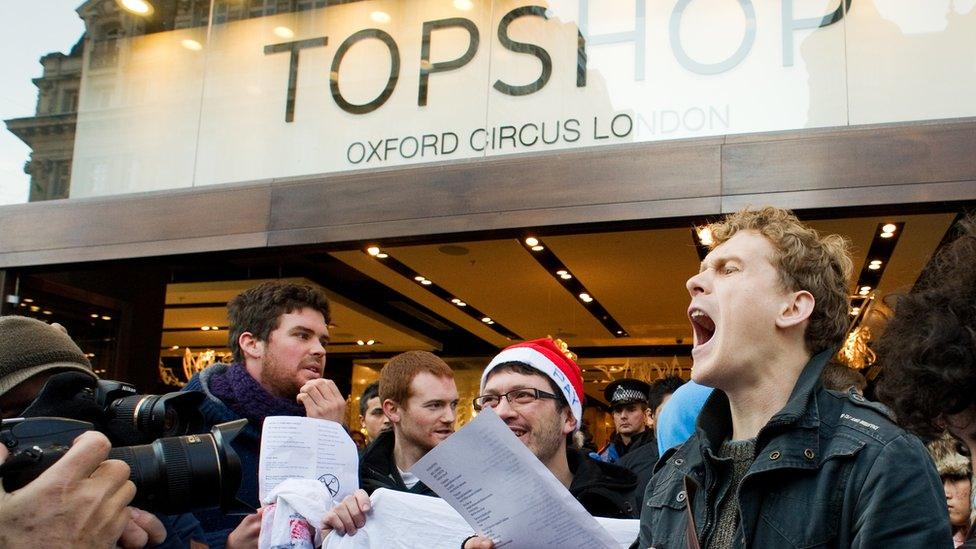
Activists targeted BHS, Topshop and Topman in 2010
Marks and Spencer bid
Sir Philip Green is not without his admirers, even among those whose relationships with him have been distinctly rocky.
His most ambitious move came in 2004, when he put together £10bn ($16.1bn), much of it from investment banks, to make an offer for Marks and Spencer.
Sir Stuart Rose - then his rival and at the helm of Marks at the time - was impressed.
"Philip is not only a first-class retailer, he is absolutely pre-eminent in his generation in terms of his financial nous and ability," Sir Stuart told Profile.
"If I wanted to be slightly uncharitable, I could say that he came to the market to raise a very, very large sum of money at a time when money was cheap and freely available - but only Philip could have put that together. It was a pretty amazing achievement."
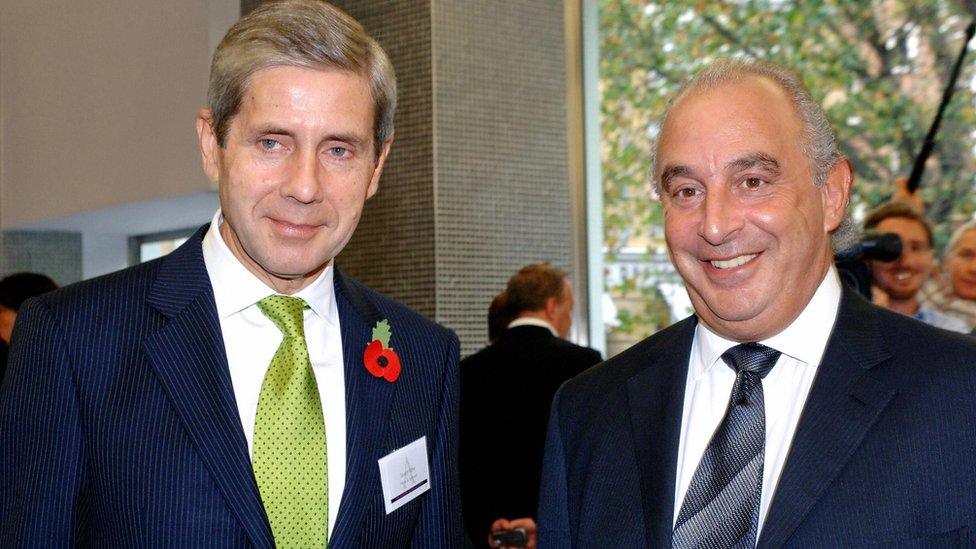
As chairman of Marks and Spencer, Sir Stuart Rose (L) faced two takeover bids from Sir Philip Green (R)
Famous temper
As for his interpersonal skills - they are another matter, and his fuse is famously short.
Sir Stuart Rose has first-hand experience of this, with Sir Philip reportedly grabbing the then Marks and Spencer boss by the lapels during his second unsuccessful takeover bid in 2004.
"There was a fairly physical occasion one morning, yes. I think tension had got quite high during the bid and Philip got upset about something," said Sir Stuart.
"He wasn't above ringing me up during the height of the bid and singing 'if I were a rich man' down the telephone to me, trying to point out the error of my ways [for not selling]... that I would make more money.
"He used to say, 'The only jet you know is Easyjet.'"
MPs in the Business, Innovation and Skills Committee and the Work and Pensions Committee are unlikely to be impressed by such repartee, even from the "King of the High Street".
After all, they interrogated another, more famous king in the same building just 400 years ago.
And then they chopped his head off.
This edition of Profile was first broadcast on BBC Radio 4 on Saturday, 8 December 2012. Listen again via the Radio 4 website or the Profile podcast.
- Published7 March 2016
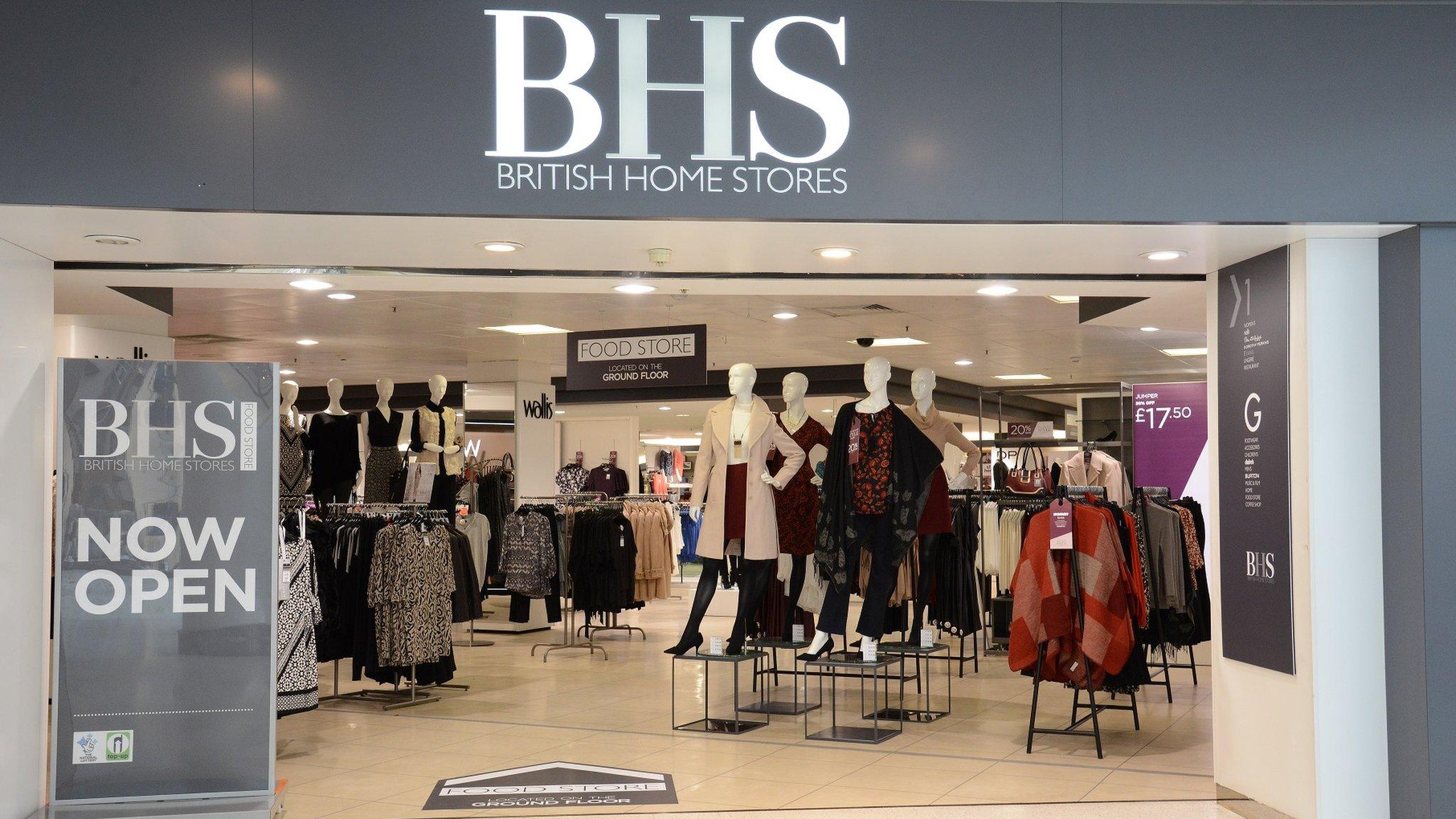
- Published25 April 2016
- Published25 November 2015
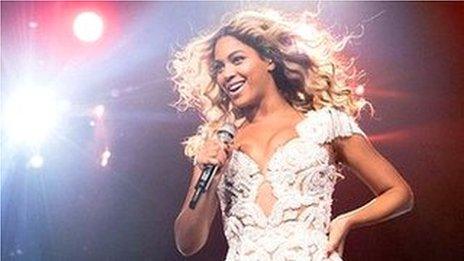
- Published25 April 2016
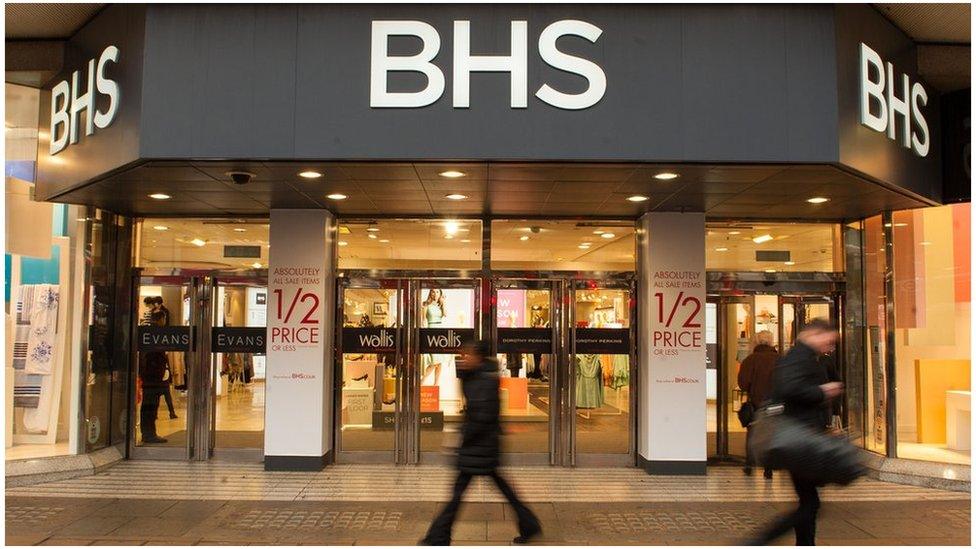
- Published12 March 2015
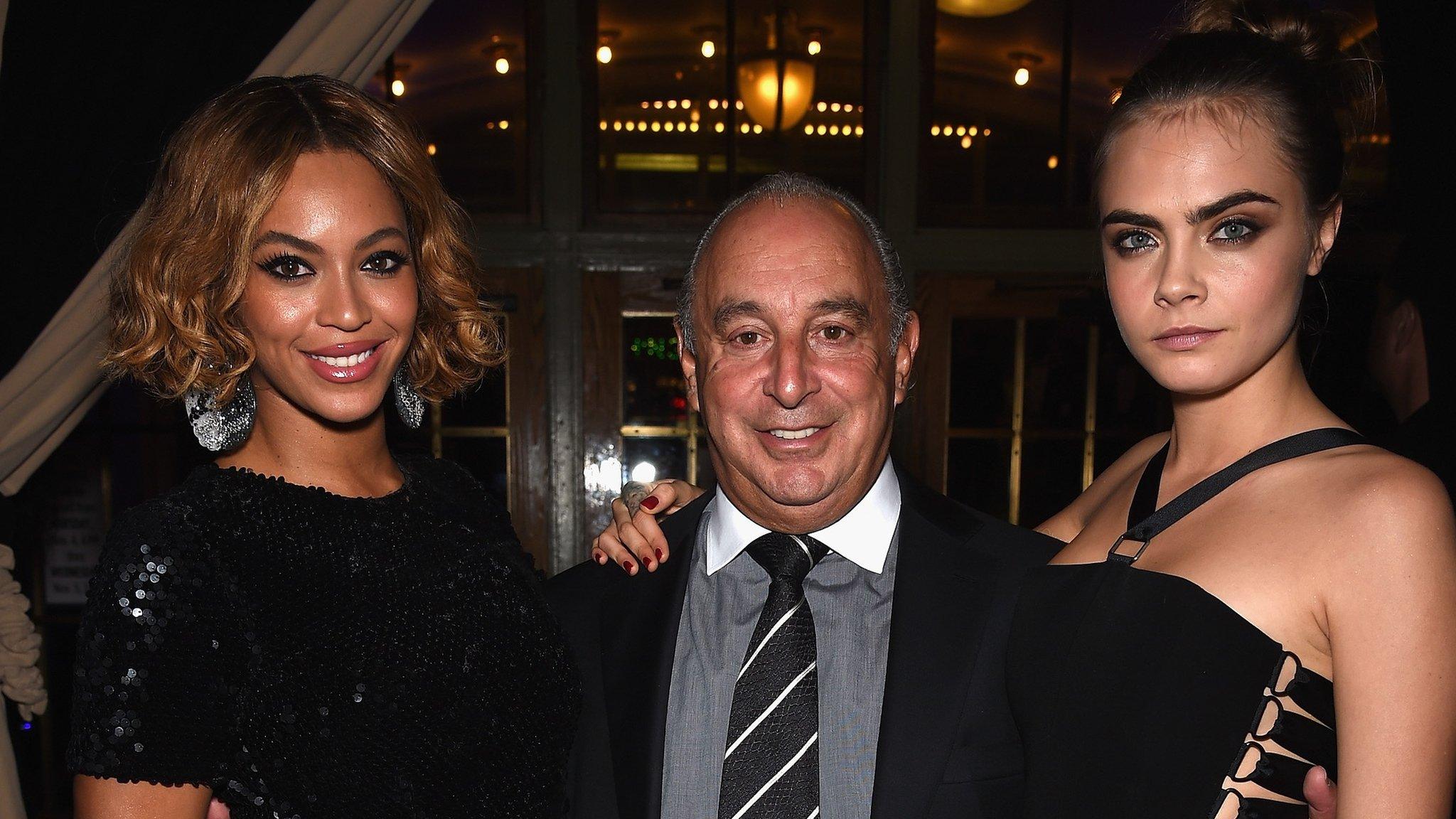
- Published11 October 2010